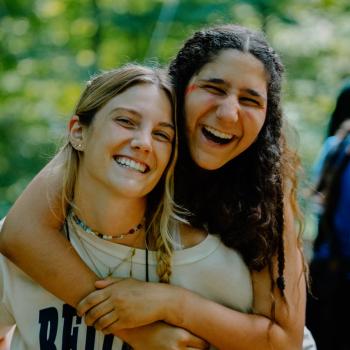![]()
An atheist once told me I was only a Christian because I couldn’t conceive of not being a Christian. I answered that I could conceive of not being a Christian, and that most days, in fact, I felt far more the atheist than the believer. The issue, I said, was that each and every one of the Catholic claims struck me as true, and so I believed.
He left disappointed, but I imagine if he spoke to me today, he would be far happier, for the answer I gave him no longer makes sense. There is a point of no return, a point that makes the thought of abandoning Christianity not impossible, but absurd.
The problem is this: Christianity is not just a belief. It is not an ideology. Beliefs and ideologies can be changed. Christianity changes the believer. I assent to being created by an Eternal God because it makes sense. It appears true. But by this assent of the reason I am changed. I cannot believe that right now, in the present moment, I am being created by Love, without changing, without becoming a person receptive to his own contingency, to the fact that I do not hold myself in being. To abandon my belief in God, even if it was a reasonable abandon, would lead to an absurdity, for not only would I have to cease believing, I would have to undo my very essence.
I’ll put it simply. Christianity is a transplant of the eyes and of the heart, by which we see the world differently by becoming incredibly different. I can no more take back Christianity than a man can take back his heart transplant. Christianity is an essential, permanent change to the disposition of the human person. It places an indelible mark on the soul and binds his very life to another. To undo Christianity and to commit suicide are synonyms. So what, is de-conversion impossible? In a word, yes.
I cannot go back to living as a happy pagan. To not be a Christian is to be waiting for your bridegroom. But once the marriage has been consummated, and I am made Christian, the rejection Christ is an embrace of absurdity. To reject Christ can never be a leaving — for marriage is eternal — it can only be an adultery, and adultery brings no peace. It only tears in two. Thus, when I truly consider leaving Christianity, I realize that such an action could only be defined as a negative — a neglect of what is truly real and existing within my person.
Through Christianity, I have experienced divine love. Now I cannot rebut its existence, I can only resist it. I have been inspired with a vision of my true-self, my eternal-self, and my saintly-self and have experienced the ethical command to become that self. I cannot go back to the happy time when I didn’t bother with becoming my self. That milestone has been passed. Forever in me is the knowledge of the self-I’m-supposed-to-be. I can only run and hide from it, ignore it, mute it, or reduce myself to a being without the capacity to see it.
I confess that Christianity is like a dog at my heels. I can’t shake it. I used to never pray, and was happy. Now, if I don’t pray, I am miserable. The love of Christ is terrifying, because it has changed me into a self for whom prayer is a necessity. Is this weakness? Perhaps, but it is also love! When we love we are changed by the beloved, changed to a person for whom the beloved is integral part of our being, identity, and existence. Truly loving someone makes the decision not to love them a denial, not a change, a death of self, not a “leaving behind.”
I used to want to be cool. When that atheist told me I was only a Christian because I couldn’t conceive of being otherwise, I wanted to impress him with my detached reasoning, my commitment to following the evidence, my highly logical conviction that “I would certainly be an atheist were I convinced of the truth of its claims!” But now I am in love, and I need to be honest. Asking me to conceive of myself-without-Christ is like asking a husband to conceive of himself without his wife. The only way he could do it is by pretending to be able to return to his past when he was a bachelor. There is no real return, for a husband-without-a-wife is a widower, not a bachelor.
I have been changed. There is no me without Christ any more. The conception of a Christless me only ever amounts to a bad attempt at conceiving Nothingness itself. And by this I am made sure that our relationship can only be one of love.












